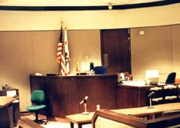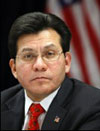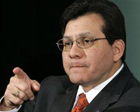|
|
|
Federal judge dismisses Katrina wrongful death claims
Breaking Legal News |
2007/05/03 03:13
|
| US District Judge Jay Zainey has dismissed part of a wrongful death lawsuit filed by families whose relatives died during Hurricane Katrina. The son of Ethel Mayo Freeman sued the federal government, including former FEMA director Michael Brown and Secretary of Homeland Security Michael Chertoff, for his mother's death. Wheelchair-bound Freeman died while waiting outside the Ernest N. Morial Convention Center for help. Zainey noted that the government has publicly admitted to the many mistakes it made before and after Hurricane Katrina but it would be pure speculation to decide whether those mistakes caused these deaths. Though most claims were dismissed by the judge, the families still intend to pursue claims left standing. |
|
|
|
|
|
|
LAPD rubber bullet barrage at protesters probed
Breaking Legal News |
2007/05/03 01:27
|
Los Angeles Police Chief William Bratton on Wednesday pledged to conduct an internal investigation to determine if police violated policy by using force to quell pro-immigration protesters. Bratton said he had seen news footage showing a number of officers in riot gear striking protesters and some members of the media to the ground with batons, and others firing foam bullets into the crowd. The incidents happened during a Tuesday rally in downtown Los Angeles. "I regret and am, as are all of you, disturbed by the events so vividly depicted in the various news videos," Bratton told a press conference at the city hall. "Police use of force in any context is always visibly and emotionally upsetting, even when necessary and lawful," the chief said. "Our challenge in reviewing and investigating the actions of the police department ... and that of the public is to determine if that use of force was an appropriate response to the level of threat, disturbance and danger that they are encountering." However, he is determined to meet the challenges, Bratton said. The Los Angeles Police Department (LAPD) will create an "after-action report" to evaluate its handling of the event, and conduct a use-of-force investigation to determine if officers responded appropriately, he added. Tuesday's rally by thousands of people calling for a path to citizenship for illegal immigrants was peaceful until about about 6 p.m., when police tried to disperse some demonstrators who had moved off the sidewalk into Alvarado Street in the downtown area. Some demonstrators responded by throwing plastic bottles and rocks at officers, police said. Several dozen riot police, wearing helmets and carrying batons, fired a few dozen volleys of foam bullets into the crowd. The clashes injured 15 police officers and at least 10 demonstrators. The Radio and Television News Association (RTNA) said earlier that "there is evidence that officers knocked reporters to the ground, used batons on photographers and damaged cameras, possibly motivated by anger over journalists photographing efforts by officers to control the movements of marchers." |
|
|
|
|
|
|
Gonzales gave firing authority to aides
Breaking Legal News |
2007/05/02 06:28
|
| An internal US Department of Justice order disclosed Monday by the National Journal gave two top aides to Attorney General Alberto Gonzales wide discretion to fire and hire political appointees within the Department who were not subject to Senate confirmation. The memo, dated March 2006, authorized then-Gonzales chief of staff D. Kyle Sampson and Gonzales's White House liaison, a post later filled by Monica Goodling, "to take final action in matters pertaining to the appointment, employment, pay, separation, and general administration" of almost all non-civil service DOJ employees. Sampson and Goodling both resigned earlier this year in the midst of controversy over their roles in the firings of eight US Attorneys for allegedly political reasons. An early version of the March order had authorized the officials to act without even having to consult the Attorney General, but the wording of the instrument was later revised at the urging of the DOJ Office of Legal Counsel, which was concerned about the constitutionality of such broad-brush delegation of power. An unnamed "senior executive branch official" quoted by the National Journal said of the order that it was "an attempt to make the department more responsive to the political side of the White House and to do it in such a way that people would not know it was going on." Senate Judiciary Committee Chairman Patrick Leahy (D-VT) expressed similar concern over the root strategy apparently reflected in the order, saying in a statement Monday: This development is highly troubling in what it seems to reveal about White House politicization of key appointees in the Department of Justice. The mass firing of U.S. attorneys appeared to be part of a systematic scheme to inject political influence into the hiring and firing decisions of key justice employees. This secret order would seem to be evidence of an effort to hardwire control over law enforcement by White House political operatives. Leahy called for the order and its supporting materials to be formally turned over to the Senate and House Judiciary committees looking into the US Attorney firings. |
|
|
|
|
|
|
Federal Court Shuts Down So-Called “Warehouse Bank”
Breaking Legal News |
2007/05/01 15:26
|
| A federal court in Seattle has shut down a nationwide “warehouse banking” scheme whose promoter falsely promised customers they could legally hide their income, assets, and identities from the Internal Revenue Service, the Justice Department announced today. The warehouse bank, known as Olympic Business Systems (OBS), is operated by Des Moines, Wash., resident Robert Arant. The court order, called a preliminary injunction, was signed on April 27 by Judge Marsha J. Pechman of the U.S. District Court for the Western District of Washington. A temporary restraining order freezing Olympic’s assets was previously signed on April 17 by Chief Judge Robert L. Lasnik. The court orders were initially filed under seal, but the court today ordered them unsealed. In papers filed in support of obtaining the injunction, the government alleged that Olympic deposited almost $28 million of customer funds into accounts that OBS maintained in its own name at commercial banks. Olympic allegedly used the funds to pays customers’ bills and expenses while promising to leave no paper trail. Judge Lasnik’s order held that Arant “is or should be aware that courts have repeatedly held that warehouse banks are tax evasion schemes.” A California federal court in 2004 permanently closed a similar warehouse bank. Details about that case are available at http://www.usdoj.gov/tax/txdv04785.htm. In 2005 a federal court in Oregon sentenced operators of a warehouse bank to prison, after their criminal convictions. Details are available at http://www.usdoj.gov/tax/txdv05070.htm.
WWW.USDOJ.GOV |
|
|
|
|
|
|
Gonzales gave aides power to hire, fire appointees
Breaking Legal News |
2007/04/30 22:56
|
| Deputy Attorney General Paul J. McNulty told congressional investigators that he had limited involvement in the firing last year of eight U.S. attorneys and that he did not choose any to be removed, congressional aides familiar with his statements said yesterday. McNulty said he provided erroneous testimony to Congress in February because he had not been informed that Attorney General Alberto R. Gonzales and his aides had been working with the White House on the firings for nearly two years, the congressional aides said. The statements Friday, during a private interview with investigators from the House and Senate Judiciary committees, make McNulty the latest senior Justice official to assert that he did not identify any of the U.S. attorneys to be fired and that his role was minimal. Gonzales, former chief of staff D. Kyle Sampson and William E. Moschella, the principal associate deputy attorney general, also told Congress they did not choose who was fired. "If the top folks at DOJ weren't the key decision-makers, it's less likely that lower-down people at DOJ were, and much more likely that people in the White House were making the major decisions," said Sen. Charles E. Schumer (D-N.Y.). Moschella was also interviewed last week. He told investigators he was solely responsible for a provision in the USA Patriot Act reauthorization law that gave Gonzales the authority to appoint U.S. attorneys for an indefinite time, a congressional aide said. Moschella also said that, when the provision was drawn up in November 2005, he was not aware of a dispute over the appointment of a U.S. attorney in South Dakota, the aide said. Justice officials have pointed to that case as a key justification for the provision, which Congress has since repealed. Democrats criticized Gonzales yesterday for giving Sampson and his White House liaison in March 2006 the authority to hire and fire certain employees. "It is disturbing to learn that the attorney general was granting extraordinary and sweeping authority to the same political operatives who were plotting with the White House to dilute our system of checks and balances in the confirmation of U.S. attorneys," said Sen. Patrick J. Leahy (D-Vt.). Administration officials said Gonzales's order, published in the Federal Register and first reported yesterday by the National Journal on its Web site, codifies a process that is standard for agencies throughout the government in dealing with political appointees. "The notion that the White House shouldn't be involved in presidential appointments is bizarre," said White House spokesman Tony Fratto. |
|
|
|
|
|
|
Supreme Court Backs Police in Chase Case
Breaking Legal News |
2007/04/30 07:46
|
| The Supreme Court on Monday gave police officers protection from lawsuits that result from high-speed car chases, ruling against a Georgia teenager who was paralyzed after his car was run off the road. In a case that turned on a video of the chase in suburban Atlanta, Justice Antonin Scalia said law enforcement officers do not have to call off pursuit of a fleeing motorist when they reasonably expect that other people could be hurt. Rather, officers can take measures to stop the car without putting themselves at risk of civil rights lawsuits. "A police officer's attempt to terminate a dangerous high-speed car chase that threatens the lives of innocent bystanders does not violate the Fourth Amendment, even when it places the fleeing motorist at risk of serious injury or death," Scalia said. The court sided 8-1 with former Coweta County sheriff's deputy Timothy Scott, who rammed a fleeing black Cadillac on a two-lane, rain-slicked road in March 2001. Victor Harris (nyse: HRS - news - people ), the 19-year-old driver of the Cadillac, lost control and his car ended up at the bottom of an embankment. Harris, paralyzed, sued Scott. Lower federal courts ruled the lawsuit could proceed, but the Supreme Court said Monday that it could not. Justice John Paul Stevens dissented. In an unusual move, the court posted the dramatic video on its Web site. |
|
|
|
|
|
|
U.S. court to decide case of Mexican on death row
Breaking Legal News |
2007/04/30 06:49
|
| The U.S. Supreme Court said on Monday it would decide whether President George W. Bush had the authority to direct a state court to comply with an international tribunal's ruling in the case of a Mexican on death row in Texas. The justices agreed to review a decision by the Texas Court of Criminal Appeals that concluded Bush had exceeded his constitutional authority by intruding into the independent powers of the judiciary. The case involved Jose Medellin, who was denied the right to meet with a consular officer from Mexico after his arrest for murder. The World Court in The Hague in 2004 ordered the United States to review the cases of Medellin and 50 other Mexican death row inmates because U.S. officials failed to tell them of their right under the Vienna Convention to talk to consular officers immediately after their arrests. Bush in 2005 decided to comply with the World Court's ruling and he directed state courts to review the 51 cases to determine whether the violation of their rights caused the defendants any harm at trial or at sentencing. Bush's action caused the Supreme Court to dismiss an earlier appeal by Medellin without deciding the merits of the dispute and to send the case back to the Texas courts. After losing before the Texas Court of Criminal Appeals, Medellin's attorneys again appealed to the Supreme Court. They said the Texas court has put the United States in violation of its undisputed treaty obligations. Bush administration attorneys supported Medellin's appeal. They said Bush acted within his authority and that the Texas court invalidated a presidential action "on a matter of international importance." Medellin, a gang member, was sentenced to death in state court for the 1993 rape and murder of two teenage girls in Houston. The brutal killings stemmed from a gang initiation. Lawyers for the state opposed the appeal. They said Bush exceeded his authority and that he cannot pre-empt Texas criminal law. The Supreme Court will hear arguments and decide the case during its upcoming term that begins in October. |
|
|
|
|
|
|
Class action or a representative action is a form of lawsuit in which a large group of people collectively bring a claim to court and/or in which a class of defendants is being sued. This form of collective lawsuit originated in the United States and is still predominantly a U.S. phenomenon, at least the U.S. variant of it. In the United States federal courts, class actions are governed by Federal Rules of Civil Procedure Rule. Since 1938, many states have adopted rules similar to the FRCP. However, some states like California have civil procedure systems which deviate significantly from the federal rules; the California Codes provide for four separate types of class actions. As a result, there are two separate treatises devoted solely to the complex topic of California class actions. Some states, such as Virginia, do not provide for any class actions, while others, such as New York, limit the types of claims that may be brought as class actions. They can construct your law firm a brand new website and help you redesign your existing law firm site to secure your place in the internet. |
Law Firm Directory
|
|










